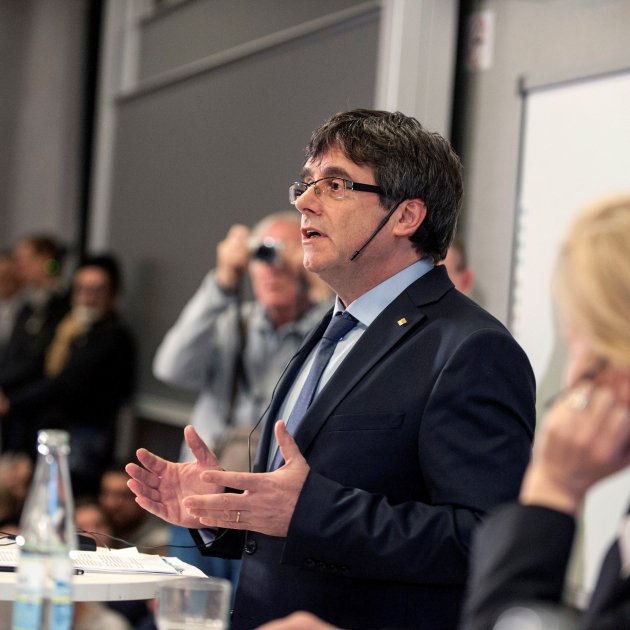The Catalan president, Carles Puigdemont, in a packed room at the University of Copenhagen, has said that if the Catalan people cannot freely choose their government, it will mean that there is no democracy in Catalonia, that "voting is useless". Not just that. He warned that with the conflict between Catalonia and Spain and the authoritarian reaction by Madrid towards the 1st October referendum, "democracy is at stake in the whole of Europe". "The shadow of Franco is still long", he said in a hard-hitting speech which described the response from Mariano Rajoy's government as vengeful.
Puigdemont arrived in the Danish capital this morning on a flight from Brussels, despite the risk of the Spanish justice system enacting a new European arrest warrant. In fact, the public prosecutor called for such a warrant after the police confirmed that the president was in Copenhagen, but Supreme Court judge Pablo Llarena dismissed it. The president travelled to Denmark from Brussels accompanied by the businessman Josep Maria Matamala.
To great media, political and academic interest, Puigdemont followed the planned agenda and spoke in a debate entitled "Catalonia and Europe at a Crossroads for Democracy?".
The event was held in a room with official capacity for 250 people which was overflowing, with people sat on the stairs and the floor and more having to follow events from outside. Many Catalans, journalists from different countries and a few Spanish citizens unhappy with the independence movement. And many students.
Puigdemont, who this morning had been proposed by the Catalan Parliament's speaker, Roger Torrent, as the only candidate for investiture as president, spoke in strong terms: "We won't yield to authoritarianism", assuring that a new pro-independence government will soon be formed. Despite being asked, however, he didn't clarify when he will return to Catalonia to take up the role.
Puigdemont, standing behind a label presenting him as the 130th president of Catalonia, started his speech expressing thanks for his reception in Denmark, a country which he immediately compared with Catalonia: "We want to become a Denmark of the south," he said. The president, who recalled the victory of the pro-independence parties in the 21st December Catalan election, called for an end to article 155 intervention, which he called a "euphemism for state of emergency" and a "disgrace for democracy", not just in Catalonia but for the whole of Europe.
The failures of the EU
The president was critical of Europe's policy towards Catalonia. "We cannot close our eyes to the failures of the EU", he said, saying that more integration is needed in the community, but linked to "more democracy". "What's happening in Catalonia is as decisive for the future of Europe as Brexit," he warned. Puigdemont condemned the European Commission's support for Mariano Rajoy's government because, in his opinion, "it has legitimised force and legal threats" against the Catalan independence movement.
In one of the many references to the country he was speaking in, the Catalan politician noted that Copenhagen has recognised the right to self-determination of Denmark's two autonomous constituent countries: Greenland and the Faroe Islands. "Denmark shows that it understands democracy as the best way to empower people," he said.
The president discussed the 1st October independence referendum, confessing the "error" of having thought that in 21st century Europe, the Spanish state wouldn't have responded with violence nor violating fundamental rights. "We were wrong", he said, before covering the effects of the repression: from imprisoned politicians "treated like terrorists" to his exile alongside four fellow ministers established in Brussels to avoid preventive detention.
Spain's revenge
He criticised the imprisonment of his colleagues more than 600 kilometres (370 miles) from home, contravening European law. "That isn't justice, it's revenge," he said.
"The fundamental problem is that Spain doesn't recognise Catalonia as a nation, as a political subject," summarised the president. He also noted that Catalan self-government predates the Spanish Constitution and that 9 of the 11 presidents of Catalonia of the last century were "fired, imprisoned, exiled or executed". Puigdemont insisted that "it's time to negotiate", but that the solution shouldn't be "penal" but "political".
The majority of the audience had unconcealed sympathies towards the pro-independence leader, but not the two other speakers in the debate, two professors from the university, who criticised the president and the management of the independence process.
Populism and Putin
Political science professor, Christian F. Rostbøll, warned that there is no democracy without borders and that the type of "identity politics which doesn't yield is populism", for which reason he asked Puigdemont if it's possible to open negotiations with Madrid.
The moderator followed this by directly asking Puigdemont if he's a populist. "No!", replied the president. "In Catalonia what we want is to express our wish with democratic tools. It has nothing to do with populism", he said, reminding of his government's wish to agree not just the date and question for a referendum with Spain, but also the possibility for it to be held in the whole of Spain, as "a solution or a proposal as a starting point".
The last to speak was professor Marlene Wind who interrogated Puigdemont with a battery of questions. Among other questions, she asked him if he thinks that Russian president Vladimir Putin is happy with the Catalan independence process. Puigdemont criticised the hypothetical link between Russia and Catalonia as not being a matter of serious academic debate, but a story from some of the media. "Please, let's be serious," he said. He also warned that theories the Catalan situation implies a risk of Balkanisation are "offensive".
